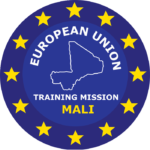

FIRST MANDATE (2013-2014)
TThe First Mandate of EUTM Mali was approved by Council Decision 2013/34/CFSP of 17 January 2013. Article 1 defined the mission, which is summarised in the following points:
- The Union shall conduct a military training mission (EUTM Mali), to provide, in the South of Mali, military and training advice to the Malian Armed Forces (MaAF) operating under the control of legitimate civilian authorities, in order to contribute to the restoration of their military capacity with a view to enabling them to conduct military operations aiming at restoring Malian territorial integrity and reducing the threat posed by terrorist groups. EUTM Mali shall not be involved in combat operations.
- The objective of EUTM Mali shall be to respond to the operational needs of the MaAF through the provision of:
- Training support for the benefit of the MaAF
- Training and advice on command and control, logistical chain and human resources, as well as training on International Humanitarian Law, protection of civilians and Human Rights.
- The activities of EUTM Mali shall be conducted in close coordination with other actors involved in the support to the MaAF, in particular the United Nations (UN) and the Economic Community of West African States (ECOWAS).


The document expressly stated the end of the mandate 15 months after the start of the mission.



SECOND MANDATE (2014-2016)
The approval of Council Decision 2014/220/CFSP of 15 April 2014 triggered the Second Mandate of EUTM Mali, without significant variations except for its extension until 18 May 2016.
THIRD MANDATE (2016-2018)
The Third Mandate began with the adoption of Council Decision 2016/446/CFSP of 23 March 2016. This new mandate increased the mission’s sphere of responsibility in 3 key areas:
- It extended the area of responsibility up to the southern bank of the Niger River, including the cities of Timbuktu and Gao.
- It began support, through decentralised training activities to the Units and Headquarters of the Military Regions.
- It began to support G5 Sahel, in the framework of activities with the Malian Armed Forces, improving its interoperability with the rest of the armies that make up the G5 Sahel Joint Force.
Finally, this decision extended the mission until 18 May 2018.




FOURTH MANDATE (2018-2020)
On 14 May 2018, with General Millán in command of the mission since 31 January, the Fourth Mandate was launched, as approved by Council Decision 2018/716/CFSP of 14 May. Under this new mandate, support for G5 Sahel has been strengthened through training and advisory activities, while extending the mission until 18 May 2020.



FIFTH MANDATE (2020-2024)
Following a Strategic Review process, the Council of the EU decided to extend the mandate of the European Union Training Mission in Mali until 18 May 2024. This is first time that the mandate has been extended for a period of four years.
The Mission’s area of operations has been expanded and now comprises the whole of Mali. Additionally, the Council also authorised the extension of EUTM Mali’s area of operations to provide military assistance to the G5 Sahel countries. The Council also provided an increased indicative budget to the mission of €133.7 million for a four-year period.
In mid-2022, the Mandate 5 was revised, focusing EUMT Mali activities in support to MaAF within the Mission Area and until the end of Mandate 5 on strategic advice and education only. All operational and non-operational activities were temporarily and reversibly suspended while maintaining the capacity to resume when conditions are met and PSC so decides. EUTM Mali will also deliver military assistance within means and capabilities to the G5S JF and G5S armed forces to support their operationalisation.
